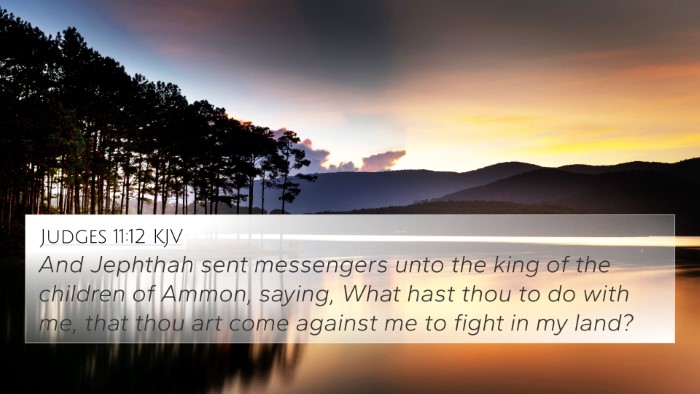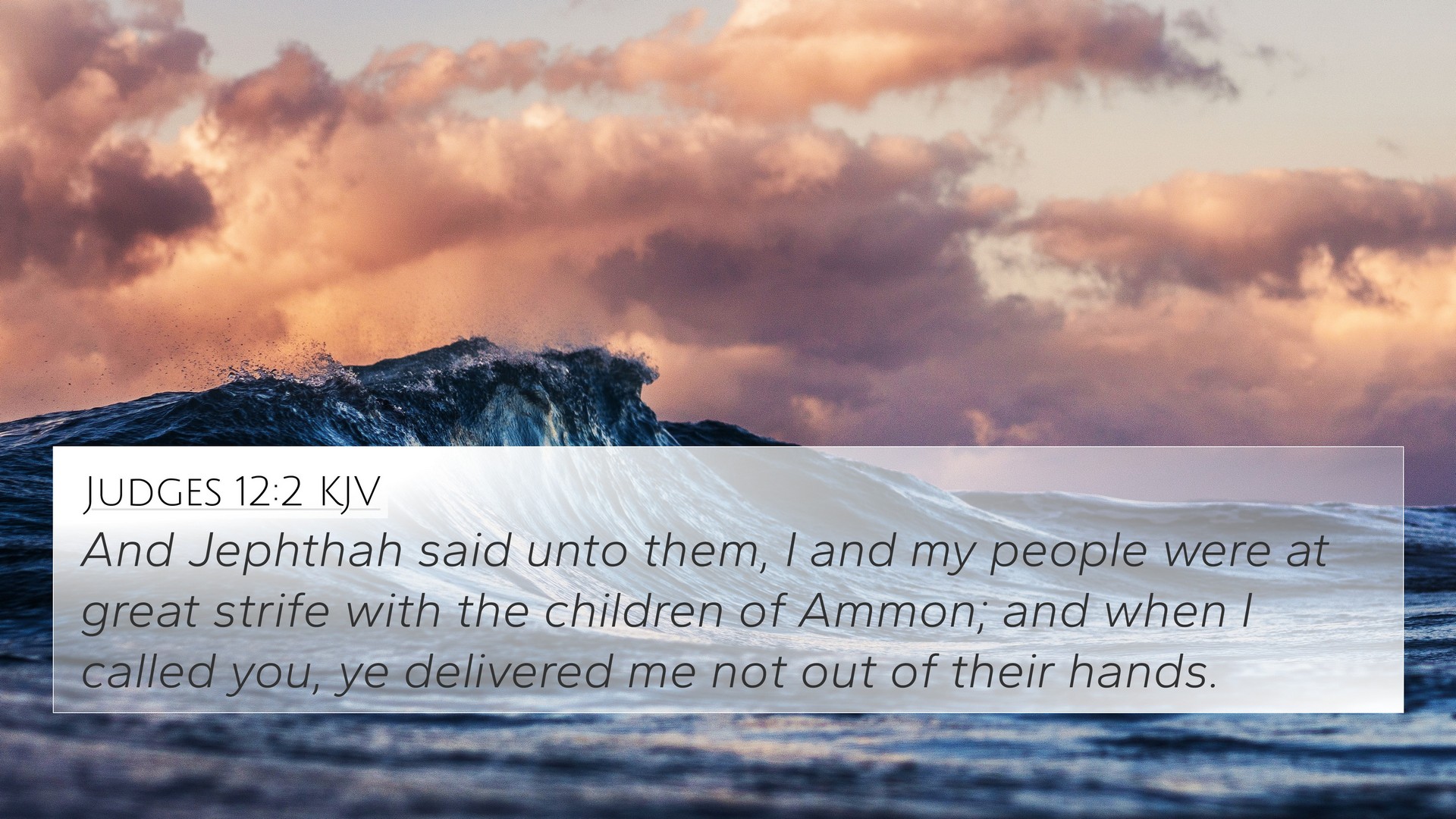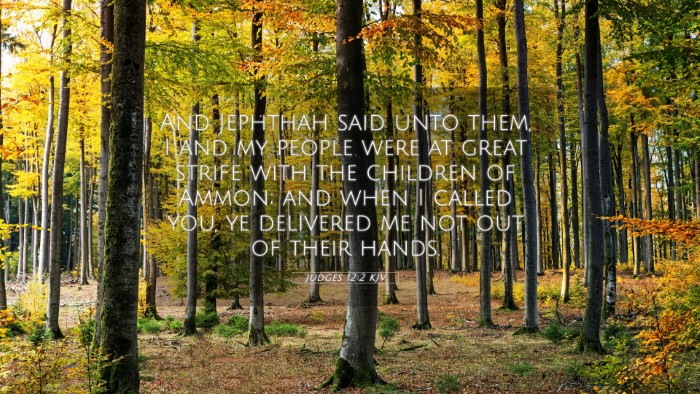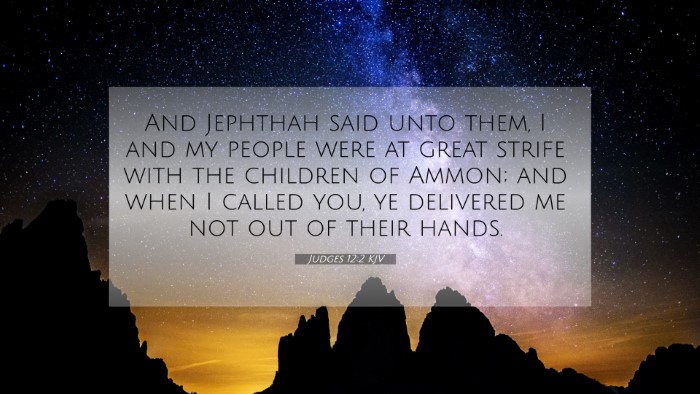Old Testament
Genesis Exodus Leviticus Numbers Deuteronomy Joshua Judges Ruth 1 Samuel 2 Samuel 1 Kings 2 Kings 1 Chronicles 2 Chronicles Ezra Nehemiah Esther Job Psalms Proverbs Ecclesiastes Song of Solomon Isaiah Jeremiah Lamentations Ezekiel Daniel Hosea Joel Amos Obadiah Jonah Micah Nahum Habakkuk Zephaniah Haggai Zechariah MalachiJudges 12:2 Similar Verses
Judges 12:2 Cross References
And Jephthah said unto them, I and my people were at great strife with the children of Ammon; and when I called you, ye delivered me not out of their hands.
Uncover the Rich Themes and Topics of This Bible Verse
Listed below are the Bible themes associated with Judges 12:2. We invite you to explore each theme to gain deeper insights into the Scriptures.
Judges 12:2 Cross Reference Verses
This section features a detailed cross-reference designed to enrich your understanding of the Scriptures. Below, you will find carefully selected verses that echo the themes and teachings related to Judges 12:2 KJV. Click on any image to explore detailed analyses of related Bible verses and uncover deeper theological insights.

Judges 11:12 (KJV) »
And Jephthah sent messengers unto the king of the children of Ammon, saying, What hast thou to do with me, that thou art come against me to fight in my land?
Judges 12:2 Verse Analysis and Similar Verses
Understanding Judges 12:2
Judges 12:2 states: "And Jephthah said unto them, I have not offended you, but you are the ones who have offended me by fighting against me." This verse illustrates a conflict that arises within the narrative of the Book of Judges. In examining this passage, we draw insights from several public domain commentaries, synthesizing their perspectives for a comprehensive understanding.
Historical Context
The context of Judges revolves around the cycles of Israel's sin, oppression, and deliverance. Jephthah, a judge of Israel, finds himself in a dispute with the men of Ephraim, representing internal strife within the tribe of Israel. This reflects larger themes of unity and division among God’s people.
Commentary Insights
- Matthew Henry: Henry emphasizes the sense of injustice perceived by Jephthah. He notes that Jephthah’s response indicates his clear conscience as he defends his actions against the Ephraimites, suggesting they are the instigators in this quarrel. He begins with the assertion of his innocence, showcasing the importance of dialogue in the face of conflict.
- Albert Barnes: Barnes highlights the futility of internal fighting among the tribes of Israel. He points out that the quarrel suggests a deeper trend of disunity among the tribes and disposes of the need for unity in facing common enemies. Jephthah's declaration serves to reveal the nature of leadership during turbulent times.
- Adam Clarke: Clarke further elaborates on the language used by Jephthah, noting the strong assertion of his actions being just and honorable. He compares this conflict to others within the book of Judges, drawing parallels to Israel’s recurring themes of discord and repentance. His focus on the need for peaceful resolutions among kin is noteworthy.
Thematic Connections
This verse opens up discussions on themes such as:
- Conflict resolution within communities
- The role of leaders in addressing grievances
- Divine justice versus human perceptions of injustice
Bible Verse Cross-References
To deepen our understanding of Judges 12:2, we can refer to several biblical passages:
- Proverbs 16:7: "When a man's ways please the Lord, he maketh even his enemies to be at peace with him." - Reflecting the hope for reconciliation even amidst conflict.
- James 1:19: "Wherefore, my beloved brethren, let every man be swift to hear, slow to speak, slow to wrath." - Related to the importance of listening before responding in conflicts.
- Romans 12:18: "If it be possible, as much as lieth in you, live peaceably with all men." - A call for peace among brethren, applicable to Jephthah's situation.
- Ephesians 4:3: "Endeavoring to keep the unity of the Spirit in the bond of peace." - Highlighting the importance of unity.
- Matthew 5:9: "Blessed are the peacemakers: for they shall be called the children of God." - Emphasizing the value of peace in conflict scenarios.
- Hebrews 12:14: "Follow peace with all men, and holiness, without which no man shall see the Lord." - The significance of striving for peace in relationships.
- 1 Corinthians 1:10: "Now I beseech you, brethren, by the name of our Lord Jesus Christ, that ye all speak the same thing, and that there be no divisions among you." - Addressing the need for harmony within the faith community.
Conclusion
Judges 12:2 encourages reflection on the nature of disputes within communities, especially in the context of faith. The commentaries by Henry, Barnes, and Clarke provide valuable perspectives that assist in understanding the nuances of this passage. Cross-references enhance our comprehension and highlight the comprehensive nature of biblical themes concerning unity, leadership, and conflict resolution.
Further Study
For those interested in deeper study, applying tools for Bible cross-referencing and tools such as a Bible concordance can facilitate exploration of related themes and connections between scriptures. This method will aid in reinforcing understanding and insights gained from Judges 12:2.


